55 messages over 7 pages: 1 2 3 4 5 6 7 Next >>
druckfehler
Triglot
Senior Member
Germany
Joined 4656 days ago
1181 posts - 1912 votes    
Speaks: German*, EnglishC2, Korean
Studies: Persian
| Message 33 of 55 23 February 2014 at 1:11pm | IP Logged |
Week 8
I finished Assimil lesson 24 and Chai & Conversation lesson 19 this week.
I also read half a children's book called "The Colours of Spring". The story is about a group of parrots who fetch colours from the sun, the sky, etc. to make the girl "Spring" colourful, so that she can leave her palace. The target audience are 3-5 year olds; those are the kind of books I can read at A1 level. I noticed that I made quite a bit of progress since January. Back then I don't think I could've handled the story grammatically, but now I can understand it. I had to look up about half of the words and I don't know all the grammar yet, but I at least have some vague ideas about it.
I find that reading (children's books, song lyrics) really helps to consolidate what I've studied and also helps me get a better idea of the structure of the Persian language. It seems to give me a good base for systematic grammar study. I'd rather have moments of "ah, so that's how it works, I've seen that before" than moments of "I wonder how on earth that is actually used".
Again, here are my 6WC stats up to now:
Time Spent Studying by Day
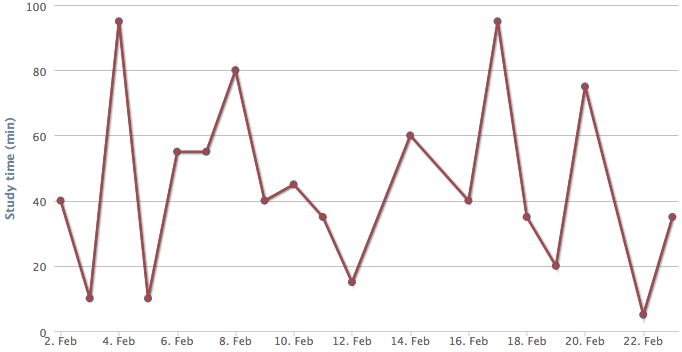
Time Spent Studying by Activity
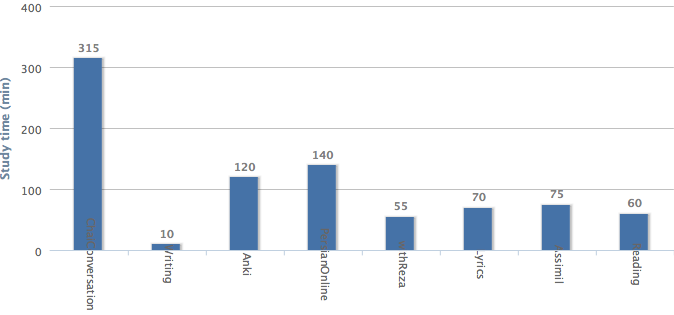
1 person has voted this message useful
| druckfehler
Triglot
Senior Member
Germany
Joined 4656 days ago
1181 posts - 1912 votes    
Speaks: German*, EnglishC2, Korean
Studies: Persian
| Message 34 of 55 01 March 2014 at 9:29pm | IP Logged |
Week 9: February Summary
Lesson-wise I did Assimil 20-24 and Chai & Conversation 16-20. I diversified my study methods a bit this month. Mainly, I added reading children's books to my semi-regular activities. I'm pretty satisfied with my progress. So far, Persian seems very easy compared to Korean. I'm sure this is partly due to knowing what works for me in language study and partly due to being objectively easier to learn for a German and English speaker.
Although I know more than I did at the end of January, I can't express a lot of things yet. But as planned, I will post a couple of sentences. I haven't gotten the following sentences corrected, but I guess they're fairly accurate. I learned the crowded-head-expression from facebook chatting with Élan :) I'm just not sure if I used the right word for "to study" in this context.
به پنجشنبه گذشته با دوست هام غذا پختم. خوشحال شدیم و غذا خوشمزه بود
be panjshanbe gozashte baa dust-haam ghazaa pokhtam. khoshhaal shodim va ghazaa khoshmaze bud.
Last Thurday I cooked with my friends. We were happy and the food was yummy.
این روزها خیلی کار دارم. باید یاد گرفت و یاد گرفت. سرم خیلی شلوغ است
in ruz-haa kheili kaar daaram. baayad yaad gereft va yaad gereft. saram kheili sholugh ast.
These days I have a lot of work. I have to study and study. My head is very crowded. (=I'm very busy.)
Edited by druckfehler on 01 March 2014 at 9:40pm
1 person has voted this message useful
| druckfehler
Triglot
Senior Member
Germany
Joined 4656 days ago
1181 posts - 1912 votes    
Speaks: German*, EnglishC2, Korean
Studies: Persian
| Message 35 of 55 09 March 2014 at 9:26pm | IP Logged |
Week 10
I haven't done much this week and the Persian team in general has gotten a bit quiet. It was a delight to have had a few couple-of-sentences-long 'conversations' completely in Persian.
I also finally got a children's book recorded, which proved very helpful for correcting some wrong pronunciation conjectures on new words. Although not all vowels are provided in the Persian abjad, there are a really only a limited number of possible guesses - but it still gets tricky when you're debating whether a syllable might be pronounced with "e" or "a", or where and if there are any consonant clusters. Here's a page from the book. I have graduated from two-liners to simple, repetitive stories :)
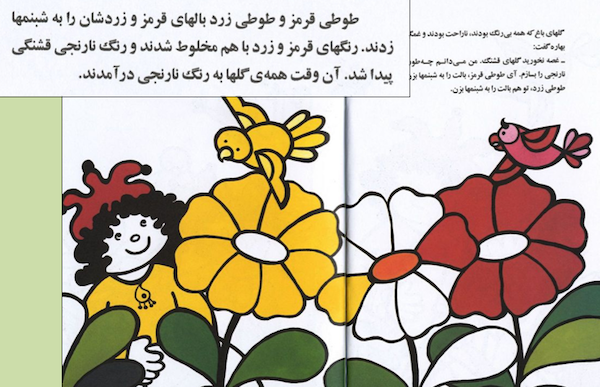
March will see me trying to eliminate the queue of new audio sentence cards on Anki, so that I can finally dive fully into phase 2 of my study plan by the beginning of April.
Edited by druckfehler on 09 March 2014 at 9:27pm
2 persons have voted this message useful
| Bakunin
Diglot
Senior Member
Switzerland
outerkhmer.blogspot.
Joined 4918 days ago
531 posts - 1126 votes    
Speaks: German*, Thai
Studies: Khmer
| Message 36 of 55 10 March 2014 at 5:28am | IP Logged |
Thanks for posting a picture of the book you're reading. I must say I find such books very difficult, even as a beginner, so I'm impressed that you manage to get through. The picture doesn't give away much about the text, and for all I know it could be anything from a simple description of the picture to some poem- or song-like verse full of phantasy words and pretty much unrelated to what we see. I would struggle.
Getting books recorded by a trusted speaker is a great idea. Back in my early Thai days, I had someone record a richly-illustrated children's encyclopedia page by page. It was a very efficient way of acquiring vocabulary. Unfortunately, it's pretty expensive (or a strain on friendships) to do this on a larger scale.
By the way, do you find Persian easier than Korean, or is it too early to say?
Edited by Bakunin on 10 March 2014 at 5:28am
1 person has voted this message useful
| druckfehler
Triglot
Senior Member
Germany
Joined 4656 days ago
1181 posts - 1912 votes    
Speaks: German*, EnglishC2, Korean
Studies: Persian
| Message 37 of 55 10 March 2014 at 12:17pm | IP Logged |
Thanks for stopping by! I was going to post in your log today, but you were faster :)
Fortunately, the text is very repetitive. It's the story of a girl called "spring", who sleeps in her palace. A group of parrots wants to wake her up and collects colours for her dress. Then they all go into the fields and deserts to make everything colourful. The description of the above picture says that the yellow and red bird touch the flowers with their wings, their colours are mixed and the whole field of flowers becomes orange.
In the whole story (20 pages) there were about 20 words I didn't know yet and they were repeated throughout. That's very good for practice. Looking back, I did understand quite a few new words without looking them up - طوطی was obviously some sort of bird, I just couldn't tell that it's a parrot. رسیدن (to arrive) was obvious from context alone. Not very surprisingly, these words have stuck in my brain much better than the ones I looked up. That makes me think trying without any help from a dictionary may really be much more efficient in the long run. It's how I learned a lot of English, too. But my tolerance for ambiguity has somehow decreased quite a bit since then.
Bakunin wrote:
| Back in my early Thai days, I had someone record a richly-illustrated children's encyclopedia page by page. It was a very efficient way of acquiring vocabulary. Unfortunately, it's pretty expensive (or a strain on friendships) to do this on a larger scale. |
|
|
Wow, recording a whole children's encyclopedia... I don't think my boyfriend would do that :) But I have no doubt it's extremely effective. I came to value Korean conversations with transcript a lot during the early intermediate phase. It was immensely helpful to be able to listen to and read fairly understandable bits of text.
Bakunin wrote:
| By the way, do you find Persian easier than Korean, or is it too early to say? |
|
|
It's still early, but so far Persian has been much easier than Korean. The word order and some expressions are a lot more intuitive, coming from the Indo-European language family. That makes it easier to speak so far. Fortunately, the most problematic features of Indo-European languages (irregular grammatical forms, something I struggled with a lot when trying to learn Portuguese) is not so pronounced in Persian. But I'm not sure how my perception will change in the future. In the later stages, I've heard there's quite a bit of Arabic grammar to contend with.
For some reason, I find Korean more aesthetically pleasing, though. I love the Korean grammar and word formation systems. So in the end, even if it's more difficult to adapt to Korean, it doesn't necessarily influence the ease of studying. How would you rate Thai vs. Polish vs. Turkish in terms of difficulty? Do you have a favorite between those three?
Edited by druckfehler on 10 March 2014 at 12:30pm
2 persons have voted this message useful
| Bakunin
Diglot
Senior Member
Switzerland
outerkhmer.blogspot.
Joined 4918 days ago
531 posts - 1126 votes    
Speaks: German*, Thai
Studies: Khmer
| Message 38 of 55 10 March 2014 at 5:59pm | IP Logged |
Ah, I see. In that case I approve of your choice of books ;) Interesting that you find that words you figured out from context stick better. I'm not sure if I have the same experience - some stick well, others not so much. But what I consistently find is that over time I develop a better sense for words I don't look up. There is never this one 'true' dictionary reference (or set thereof), the meaning of the word is rather being updated on every encounter. I surmise that my brain doesn't always update the meaning of words I've looked up because it already knows the 'true' meaning.
Why do you think your tolerance for ambiguity has decreased?
I find Polish much more accessible for me as a German speaker than Thai in terms of structure, vocabulary and, obviously, culture. This makes a huge difference. Polish is structurally quite similar to German, e.g., word order, cases, comparisons, possessions, modes etc., work pretty much the same. In terms of vocabulary, there are tons of cognates, especially in the higher registers; not so in Thai - cognates with European languages are few and far between. And in terms of culture, i.e., what people actually say, obviously Polish norms, values, habits, references, sayings, etc., are much closer to what I grew up with than Thai.
I can't comment on Turkish, I've started only ten days ago! But from what I can already see, it's again a pretty different animal in terms of structure, vocab and culture. However, I've already noticed quite a few cognates in the higher register (listening to the news), much more than I would ever encounter in Thai. That's probably because Turkey is geographically so close, Sprachbund and so.
Do I have a favorite? That must clearly be Thai. I love the script, the weird Pali loanwords, their way to express things. I also love many things about the culture, the food, the smiles. So, Thai is a clear favorite. With regards to Polish, I really like the sound. I also like the way they inflect numbers and express the conditional. It's too early to say much about Turkish, but I think I will love the agglutinative nature of the language, the vowel harmony and the generosity and hospitality of the people.
2 persons have voted this message useful
| druckfehler
Triglot
Senior Member
Germany
Joined 4656 days ago
1181 posts - 1912 votes    
Speaks: German*, EnglishC2, Korean
Studies: Persian
| Message 39 of 55 16 March 2014 at 1:02pm | IP Logged |
Week 11
The 6 Week Challenge ended yesterday. I studied Persian for 22 hours and 10 minutes during February and the first half of March and am happy with that number, which averages about half an hour per day.
This week I spent time on another Persian song, Zemestoon by Afshin Moghaddam, an oldie from the 70s. You can have a listen on youtube and see the lyrics with translation here. So far I've mined the first half of the lyrics for vocabulary. I was happy to understand this line immediately on the first listen:
مثل من که بی تو نشستم زیر بارون زمستون (mesle-man keh bi to neshastam zire-baroone-zemestoon; Like I who - without you - have been sitting under the winter rain)
Time Spent Studying by Day
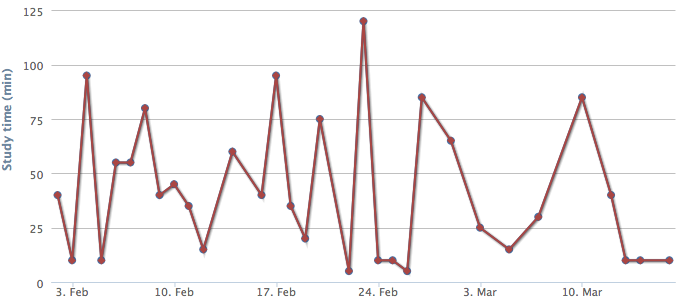
Time Spent Studying by Activity
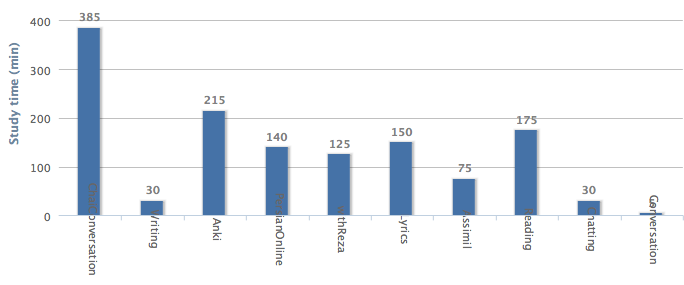
Bakunin wrote:
| Why do you think your tolerance for ambiguity has decreased? |
|
|
I guess it has to do with becoming more driven to learn languages. With English, I just wanted to read things and learning was the byproduct. Now I'm focusing on actually studying and think I want to learn all the new words I come across, not just have more or less vague, unconfirmed ideas about them. But I know this is a trap. In the end, quantity is more effective for internalising all these words and their appropriate contexts. Working on precision comes much later.
Bakunin wrote:
| I can't comment on Turkish, I've started only ten days ago! |
|
|
I totally forgot, because it just feels like you've been studying for a while, seeing how you can already read sentences about polar bears :)
1 person has voted this message useful
| jamesleecoleman
Newbie
United States
Joined 4275 days ago
38 posts - 52 votes 
Studies: Russian, Persian
| Message 40 of 55 25 May 2014 at 1:32am | IP Logged |
Still working on Farsi?
2 persons have voted this message useful
|
You cannot post new topics in this forum - You cannot reply to topics in this forum - You cannot delete your posts in this forum
You cannot edit your posts in this forum - You cannot create polls in this forum - You cannot vote in polls in this forum
This page was generated in 0.5938 seconds.
DHTML Menu By Milonic JavaScript
|











